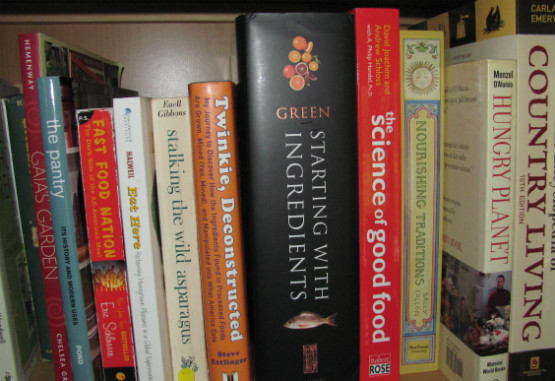
My name is Wilson, and I am a bibliophile. I also love food, so when it comes to information about food, food science, cook books, agricultural techniques, etc. I tend to surround myself with a lot of good content. Of course Chaya and I have our favorite online resources as well, but when it comes to books, I wanted to share some of my favorites resources with you that I rely upon when I write a blog and tell you how they got to be that way.
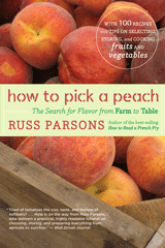 Does the author love food too?
Does the author love food too?
Now I know what you are thinking, “well, duh, they took the time to write the book.” But I mean does the passion comes through. Can you see him/her drive past the supermarket to buy from the lady selling produce out of the back of her pickup truck? These are the kinds of people I really like to read. One book I recently had to finally let collapse on the floor as I went to bed waaaaaay too late after getting sucked in by the first paragraph in the introduction is Russ Parsons’ How to Pick a Peach. Russ is a cook (bonus) who advocates eating local (double bonus) and is a student of farming (trifecta).
Does the author know what they are talking about?
Just because there is ink on the page, does not mean that it contains worthwhile information. To pull this off someone usually has to put in a lot of study. As in went to school and paid money to gain higher education. For this, who better (or funnier) than Robert L. Wolke? His books What Einstein Told His Cook and What Einstein Told His Cook 2 are hilarious. Robert is professor emeritus of Chemistry at the University of Pittsburg, he gets additional bonus points for being married to a cook as well as winning the James Beard Foundation (more on them later) Award for his Washington Post column, Food 101.
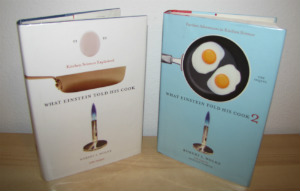
Does the author get angry about something?
Let us face it, if someone is just demure about their life’s work—do you really want to read it? Sally Fallon Morell’s book, Nourishing Traditions is a classic not because it is ambivalent towards food quality and nutrition, but rather because Sally is not politically correct about food. Sally is going to tell it like it is which is why her book gets top shelf rating in our house. Enzymes to Egg yolks, Riboflavin to Raw Milk you can count on Sally to cover it like you can count on Carla Emery to give you the skinny on building a chicken coop.
Does the author say it with tact?
Even if you are angry or passionate about something, you still need good delivery to be convincing. Homemade bread is something near and dear to my heart and I picked up the book by Steve Ettlinger, Twinkie, Deconstructed because I thought it looked funny. I thought that it would be a good break from the serious titles I normally read about food. Little did I know that Steve is a word wizard and a dozen pages into it you are already questioning why you ever even thought eating a Twinkie was a good idea in the first place. Making the case for what goes into one of the free world’s favorite snack cake needs to be handled delicately. After all, the Woody Harrelson (a real life vegan) character in Zombieland was willing to kill the undead over Twinkies, and rest assured, Steve does a splendid job with telling the ingredient label’s story.
Is the book easy to reference?
I stay pretty busy. So when I need information on imitation vanilla, you can bet I do not want to have the same experience with looking in the phone book for “Concrete Saw.”
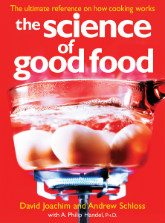 Concrete, see Cement.
Concrete, see Cement.
Saw, see Cutting Device.
Cutting Devicce, see Rotary Blade.
Rotary Blade, see Sharp Steel Disc.
(You get the idea)
For brevity, clarity and sheer scientific heft I saved my favorite book for last, The Science of Good Food by David Joachim and Andrew Schloss (who write other great books too). These boys will give you the low-down on just about anything you can consider edible.
Here is the rest of the list of my for other go-to’s:

You may notice these three titles Process This! by Jean Anderson, The Penguin Companion to FOOD by Alan Davidson and The Bread Baker’s Apprentice by Peter Reinhart all share something on the cover? Yep, it is the James Beard Foundation Award. If you are like me and you haunt library book sales and peruse yard sales for boxes of books, you might find a book bearing this embossed symbol. I say, “buy it,” you will likely not be disappointed.

As a tangent, Penguin also publishes Michael Polan’s In Defense of Food and 10 Speed Press (a division of Random House which is now the publisher for The Encyclopedia of Country Living) also publishes Hungry Planet which is a fascinating read/study with photography so high quality you can own it as a coffee table book. The Bread Baker’s Apprentice is so good, one day I will have to do a whole review just on that book by itself!
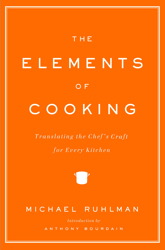 I also recommend Michael Ruhlman’s book, The Elements of Good Cooking (Simon and Schuster another great publisher). Aliza Green’s book, Starting with Ingredients (Running Press) is always sure to be within reach of the kitchen—from goat cheese filling to green beans, duck livers to Dutch Boeterkok it is hard to get more thorough than this book. And last by not least is the never-fail, 15th edition, family heirloom Better Homes and Gardens Cookbook. My Mommy-in-law got it for her wedding from her mother, and Chaya got it for our wedding from her mother, and Bugaloo will get one for her wedding (after she turns 35) someday as well. From how to boil water to how to make the chocolate chip cookies that moms the world over are famous for, this is a standby in our kitchen.
I also recommend Michael Ruhlman’s book, The Elements of Good Cooking (Simon and Schuster another great publisher). Aliza Green’s book, Starting with Ingredients (Running Press) is always sure to be within reach of the kitchen—from goat cheese filling to green beans, duck livers to Dutch Boeterkok it is hard to get more thorough than this book. And last by not least is the never-fail, 15th edition, family heirloom Better Homes and Gardens Cookbook. My Mommy-in-law got it for her wedding from her mother, and Chaya got it for our wedding from her mother, and Bugaloo will get one for her wedding (after she turns 35) someday as well. From how to boil water to how to make the chocolate chip cookies that moms the world over are famous for, this is a standby in our kitchen.
So many books, so little time. So how do you write a food blog? Well, first be passionate about food—this is key. Second, surround yourself with good content that is easy to reference. I certainly cannot remember everything, so if you cannot find it, then how will you know it when you need to? Lastly, keep asking good questions. I love digging deep into resources to find out what is the perfect balance of citric acid for preserving apples from the amylase browning the fruit.
May be you do not wonder about that, but I bet there is something about your food that makes you scratch your head. Have a question? Put it in the comment section, I will try my best to get an answer for you.
“Never lose a holy curiosity.” Albert Einstein
Wilson
Pro Deo et Patria
Photo Credits:
Keyboard with Fruit by Pantry Paratus
Works Cited:
Einstein, A. (n.d.). Einstein quotes. Retrieved from http://www.einstein-quotes.com/ThinkingKnowledge.html
